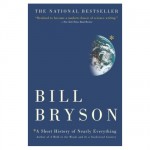Book of the Week- A Short History of Nearly Everything
Saturday , 17, January 2009 Books Leave a commentThis week’s book was Bill Bryson’s A Short History of Nearly Everything, which is pretty much just what it sounds like.
This was another Christmas present- which, like the other Christmas books I mentioned, I probably never would have chosen on my own. Frankly, I was a little worried about reading this. I’ve read a handful of other Bill Bryson books, my favorite probably being The Mother Tongue, a history of the English language. I read it at some point in high school, and it jump started an interest in linguistics. Unfortunately, a college linguistics professor, while lauding Bryon’s ability to stir up interest in linguistics, suggested that the book ought to be categorized as fiction due to the numerous factual errors. So it was a good read and entertaining, but not credible. The reviews on the Amazon page do a good job describing some of the issues. With this concern in mind, I hesitated before starting this book.
In this sense, it’s similar to last week’s book, Papillon. Reading something presented as fact while thinking that some unknowable portion of the book is likely to be fiction makes for a bit of an awkward experience. With Papillon, however, it’s easy enough to decide not to care- it’s not a great leap from memoir to historical novel. ASHoNE is quite the opposite- it’s hard to meld fact and fiction in what’s basically a narrative reference book. Fortunately, there’s a pretty clear divide in this book between the science he presents and the narrative he presents it in, allowing a reader to try to understand the science he presents and treat the rest- the biographical background to the science- as amusing anecdotes without worrying really whether they’re true. They most likely are- the reviews of this book are generally far more positive than the other. Additionally, where The Mother Tongue has a selected bibliography, ASHoNE has a page-by-page bibliography.
I’ve lingered too long on my thoughts before reading the book, but I think my prejudices before reading paid off. A book like this is a good thing to read every once in awhile. It’s been 6 years since I’ve taken any sort of an interest in science, so it’s good to be refreshed on the basics, especially regarding physics and chemistry- things I never had too firm a hold on anyhow. The sections on biology were good too, though its subject matter that, for whatever reason, I’ve never let get too dusty. I especially liked his exploration of the various ideas on where humans came from. This section in particular displayed his skill in discussing the various controversies. One of the scientists he quotes (I can’t find the page, so I’ll paraphrase) says about important discoveries: “First, they tell you you’re wrong. Then they tell you it doesn’t matter. Then they give credit to the wrong person.” This scenario comes up fairly often, but it’s especially interesting in the human development arena, as there still isn’t any scientific consensus.
Another thing I’d forgotten/never realized is how recent most of these major discoveries have been. The structure of DNA was figured out until mid-century, yet my high school text book was describing in detail the mechanics of DNA replication and protein construction. The fact that so much as been done so recently, unfortunately, makes it all the more likely everything we know is wrong, but it’s striking to think that I, as a casual reader, have way mroe knowledge of biology and chemistry and phsyics as nearly anyone did 100 or even 50 years ago, and they were making all these amazing discoveries based on guess work and pure thinking.
I read the book with my blackberry in hand, stopping every ten pages or so to look up something on wikipedia to get a better understanding of whatever he was talking about. The narrative elements are great too- they keep the story moving forward and give it a readability would otherwise make it just a sketchy textbook. Like I said, I took the stories with a grain of salt- not necessairly because I don’t believe them, but because it doesn’t matter. I’m glad to ave read it, and I’d recommend it to anyone who’s looking for a quick refresher on.. well, stuff. I wouldn’t cite it in anything above a junior-high type report on the sun or something, but that works otu well, because I’m not in a position to be writing papers about the sun.

